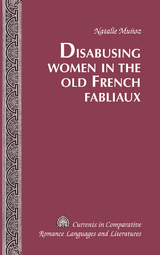Disabusing Women in the Old French Fabliaux
Seiten
2014
|
New edition
Peter Lang Publishing Inc (Verlag)
978-1-4331-2656-7 (ISBN)
Peter Lang Publishing Inc (Verlag)
978-1-4331-2656-7 (ISBN)
Spanning the late twelfth and thirteenth centuries, the fabliaux are short, ribald tales written in verse by mostly anonymous male authors. Disabusing Women in the Old French Fabliaux provides a much-needed reevaluation of the role of women in the fabliaux.
Disabusing Women in the Old French Fabliaux provides a much-needed reevaluation of the role of women in the fabliaux. Spanning the late twelfth and thirteenth centuries, the fabliaux are short, ribald tales written in verse by mostly anonymous male authors. Their varied portrayals of female characters have traditionally been considered simply misogynistic. Despite recent scholarship contending that the fabliaux are not as anti-feminist as previously thought, there has been until now no full-length study of women in the fabliaux.
Serving as critics of medieval institutions such as courtly love and knighthood, women in diverse roles affirm their agency as subjects through the manipulation of language. The depiction of these women asserting their subjectivity within medieval literary and cultural conventions often distorts the normal relations between the sexes, putting into question the very gender framework within which the fabliaux operate. Written by men for men, the closing moral frequently serves to reassert traditional male dominance, thereby reducing any uneasiness the audience may have felt. Thus the fabliaux cast women as powerful users of language all the while acknowledging the limits of their subversion.
Disabusing Women in the Old French Fabliaux provides a much-needed reevaluation of the role of women in the fabliaux. Spanning the late twelfth and thirteenth centuries, the fabliaux are short, ribald tales written in verse by mostly anonymous male authors. Their varied portrayals of female characters have traditionally been considered simply misogynistic. Despite recent scholarship contending that the fabliaux are not as anti-feminist as previously thought, there has been until now no full-length study of women in the fabliaux.
Serving as critics of medieval institutions such as courtly love and knighthood, women in diverse roles affirm their agency as subjects through the manipulation of language. The depiction of these women asserting their subjectivity within medieval literary and cultural conventions often distorts the normal relations between the sexes, putting into question the very gender framework within which the fabliaux operate. Written by men for men, the closing moral frequently serves to reassert traditional male dominance, thereby reducing any uneasiness the audience may have felt. Thus the fabliaux cast women as powerful users of language all the while acknowledging the limits of their subversion.
Natalie Muñoz received her doctorate from the Department of French and Francophone Studies at the University of California, Los Angeles. Dr. Muñoz has taught at the high school, community college, and university levels. She currently teaches French and world language pedagogy at Fresno State University.
Contents: Defending Women: Women Fighting Against Social Norms – Designing Women: Women’s Use of Manipulation in the Fabliaux – Desiring Women: When Objects Become Subjects.
| Erscheint lt. Verlag | 24.6.2014 |
|---|---|
| Reihe/Serie | Currents in Comparative Romance Languages and Literatures ; 230 | Currents in Comparative Romance Languages and Literatures ; 230 |
| Mitarbeit |
Herausgeber (Serie): Tamara Alvarez-Detrell, Michael G. Paulson |
| Verlagsort | New York |
| Sprache | englisch |
| Maße | 150 x 230 mm |
| Gewicht | 310 g |
| Themenwelt | Literatur ► Klassiker / Moderne Klassiker |
| Geisteswissenschaften ► Sprach- / Literaturwissenschaft ► Anglistik / Amerikanistik | |
| Geisteswissenschaften ► Sprach- / Literaturwissenschaft ► Literaturwissenschaft | |
| Geisteswissenschaften ► Sprach- / Literaturwissenschaft ► Romanistik | |
| Sozialwissenschaften ► Soziologie ► Gender Studies | |
| ISBN-10 | 1-4331-2656-7 / 1433126567 |
| ISBN-13 | 978-1-4331-2656-7 / 9781433126567 |
| Zustand | Neuware |
| Informationen gemäß Produktsicherheitsverordnung (GPSR) | |
| Haben Sie eine Frage zum Produkt? |
Mehr entdecken
aus dem Bereich
aus dem Bereich
Buch | Softcover (2024)
belleville (Verlag)
20,00 €
Poetik eines sozialen Urteils
Buch | Hardcover (2023)
De Gruyter (Verlag)
59,95 €




